HIT CHANNEL EXCLUSIVE INTERVIEW: April 2024. We had the great honour to talk with a legendary musician: Dave Pegg. He is best known as the bass player of folk rock pioneers, Fairport Convention for 55 years. From 1979 to 1995 he was a member of Jethro Tull recording with them albums such as “The Broadsword and the Beast” (1982) and “Crest of the Knave” (1987). He has also recorded with Nick Drake, John Martyn, Richard Thompson, Ralph McTell and many others. Before joining Fairport Convention he was a member of The Way of Life featuring future Led Zeppelin drummer, John Bonham and The Beast featuring Cozy Powell (Rainbow, Black Sabbath -drums) and Clem Clempson (Colosseum, Humble Pie -guitar). In 2018, Dave Pegg published his autobiography “Off the Pegg: Bespoke Memories of a Bass Player” with Nigel Schofield. The latest Fairport Convention studio album, “Shuffle and Go” was released in 2020. Fairport Convention’s annual Cropredy Festival will take place this year on 8-10 August. Read below the very interesting things he told us:
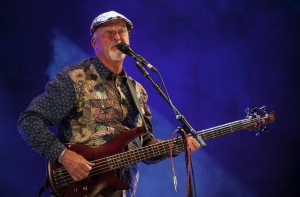 What should fans expect from your upcoming Cropredy Festival on 8-10 August?
What should fans expect from your upcoming Cropredy Festival on 8-10 August?
We play on two occasions: We play on Thursday, we do a quick “hello” to all the fans at 4 o’clock. It’s a very special time, Thursday 8th of August at 4 o’clock, because there is a bell hanging in Cropredy church, it’s called “the Fairport Festival bell” and it was renovated and made to work again by donations from Fairport fans from the festival. There is a song that Chris Leslie (ed: vocals, mandolin, violin, harmonica) wrote called “The Festival Bell” which celebrates the events. So, at 4 o’ clock every second Thursday in August when the festival starts the bell is rung and then we sing that song (laughs) on the stage and we play for about 20 minutes with more or less an acoustic line-up, without the drum kit. We have our ex-drummer Dave Mattacks coming all the way from America; he lives near Boston. But Dave will be playing percussion with us on Thursday and then he’ll join us on Saturday evening at about 20:30-21:00-21:30. We play for 2 ½ -3 hours and it’s Fairport Convention and some surprise guests, some of our musician friends come and join us and we play some of their songs.
Please tell us a few words about Gerry Conway (drums) who passed away on 29 March.
It was very sad. Gerry had been very ill for a couple of years. Well, not very ill; when Gerry stopped playing with us, we didn’t really know what the issue was with his health, but it just got progressively worse and sadly he passed away on 29th March and he will be sadly missed by all of us. I played with Gerry for many years because Gerry was also in Jethro Tull, a band that I played with for 15 years. Gerry was on the Jethro Tull album, “The Broadsword and the Beast” (1982), which was my favourite album that I was involved in and Gerry does some fantastic drums and percussion on that album. In fact, there is a new box set which Ian Anderson put together, a few months ago. It’s a box set of “The Broadsword and the Beast” and there is a really lovely booklet in there where Ian talks about Gerry Conway in great depth and gives him an awful lot of credit for the way that that album sounded because of his drums and percussion on that. In fact, on everything that Gerry did, he was an amazing drummer with an incredible sense of time and rhythm. You know, every drummer that knew Gerry will tell you the same thing: His sense of time and his taste was impeccable.
Are you happy now that Dave Mattacks (drums) is back in the band?
Yes. Well, Dave is not a member of the band because Dave has the record of being in Fairport and leaving Fairport three times. So, he has a record for coming and going three times, which is why he said: “There is no point in me joining the band again, because I ‘ve already got that record” (laughs). He comes over as a guest for us; he will be joining us at Cropredy on August the 8th, 9th and 10th and he ‘ll be joining us next February and March when we do our English winter tour. We are very happy to have Dave back, myself especially, because we are very in tune with each other’s playing. We are very happy as a rhythm section together and we ‘ve made so many tracks and played on so many pieces of music for various styles of music, but Fairport is our big love and it’s a very special combination of drums and bass that we hope to conjure up for Cropredy next August.
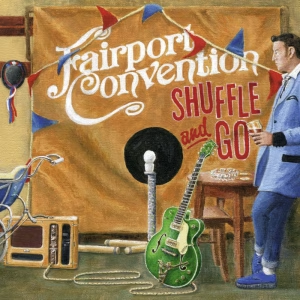 “Shuffle and Go” is the last Fairport Convention studio album. What was the difference between this album and the previous ones?
“Shuffle and Go” is the last Fairport Convention studio album. What was the difference between this album and the previous ones?
The difference between “Shuffle and Go” and the other ones: This is quite amazing, because when we recorded “Shuffle and Go” the order that the songs and the instrumentals appeared on the final CD, was the order that we recorded them in (laughs). That wasn’t intentional and it’s never happened before; it just happened. It’s a kind of karma, it’s just a kind of magical thing when at the end of all the recording, you ‘ve got so many tracks and you think: “Ok. Now, we have to put them in order”. So, we just played everything back in the order that we recorded it and we said: “Well, that works! Let’s keep it like that” and that’s what we did. It’s an album that we are all very-very happy with, we all felt that there weren’t any kind of filler tracks or things that we put on there just to make up the amounts of time that you need for a CD. We liked all of the songs and all of the contributions, especially from Chris Leslie, he has become an incredible songwriter who writes stuff that we all really love and we love to play and that’s why “Shuffle and Go” meant so much to us. Then, of course, Covid happened, so we couldn’t go out and tour with the album. We did about three weeks of playing the music live and that’s not long enough to get the music out to the people. There is a difference when you do a live performance from how you put stuff up in the studio, which is why we still enjoy playing stuff from “Shuffle and Go”, especially, because for us it’s pretty fresh and of course it’s fresh for Dave Mattacks because he wasn’t on that album. So, he is really enjoying things like Ric’s (ed: Sanders -violin, keyboards) instrumental, “Steampunkery”, which is an incredibly difficult piece to play, but a fascinating piece to play, if you are a drummer or a bass player. Dave is really happy playing stuff from “Shuffle and Go” and of course having Dave back in the band means we can do lots of stuff from “Full House” (1970), “Angel Delight” (1971) and “Liege & Lief” (1969), which he was actually involved in.
I really like “Good Time for a Fiddle and Bow / The Christmas Eve Reel” from “Shuffle and Go”. How did it come about?
Oh, it’s one of Chris Leslie’s songs. He comes from a kind of folk background and was very influenced by Dave Swarbrick, who was Fairport’s violinist on those great albums like “Liege & Lief”. Swarb was a hero or if you like, the biggest influence for English violin players and in fact for a lot of Scottish and Irish violinists. He was very much respected, Dave Swarbrick. Chris was very influenced by him, as well, so Chris sometimes writes things which are very folky and he ‘ll try and get traditional tunes in them, as well, so he can play us fiddle (laughs). That’s where these influences come from.
What are the projects you are currently involved with?
I live in Britanny now, in France, so I’m trying to become a Celt (laughs). I ‘m drinking an awful lot of Scottish whiskey and an awful lot of Irish Guinness in the hope that it will change my blood and make me a Celt, because I’m Celt at heart, as my fellow Bretons, people that live in Britanny are. So, I’m involved in music over here, to some extent. In fact, on June 15th we have our fête (ed: feast or religious festival in French), in a village here, it’s a very small village. It only has 12 houses but have 100 people coming and we do music for about 4 or 5 hours. We ‘ve got some of my English friends and a great Breton band called The Churchfitters come and play every year and sometimes Dan Ar Braz, who is a very famous Breton guitarist (ed: and former member of Fairport Convention) comes and plays. I also do some recordings at my friend’s studio in Nantes, James Wood, for various people in England when they ask me to play bass, which I love doing. I love playing music and if people ask me to play on their albums, I ‘m always keen to do that, because when you are a musician you never stop, it never becomes a job. It ‘s never been a job for me, it ‘s always been something I ‘ve really loved and enjoyed, so any opportunity to play, I’ll be out there, unless it’s football or rugby. If it is music, is good.
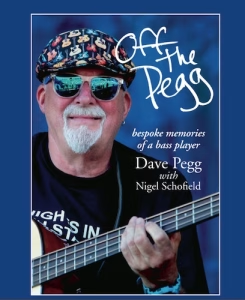 How did you come up with the idea to write your “Off the Pegg” autobiography”?
How did you come up with the idea to write your “Off the Pegg” autobiography”?
(Laughs) Thank you, Thodoris. The book came about because I have lots of stories from my experiences playing music all over the world, meeting people and things that have happened to me and many of my friends said: “Oh, you should write them down, Dave. They are very funny stories. You should write a book” and I said to them: “I’m not clever enough to write a book” but I have a very good friend, Nigel Schofield who is an expert on Fairport Convention and an expert on many-many things, The Beatles is an expert on, and he’s an expert on English traditional music, as well. Nigel is a very good man and then he said: “Dave, if you want to write a book, I’ll help you, I ‘ll come to Brittany”. So, he came over for one month and we just sat and talked and had the occasional glass of ouzo and retsina and we just recorded everything and then it figured into a book. We printed 2.000 copies and sadly they ‘ve all gone. They are now collector’s items. It’s very hard to get the book. You can get it as an e-book on Amazon, which is ok, but you can’t get a hardback copy and I don’t want to print anymore, because I figure those 2.000 people who bought it, it’s gone up in value for them (laughs), so they might remember me when I ‘m gone, having something on the library shelf that it’s now worth more than they paid for it.
Are you satisfied with the feedback you got for “Off the Pegg” autobiography?
Yes, I’m very satisfied with it. A few people said grammatically was not good and there was a lot of repetition, but that’s the way I am: I failed O level English at school and I often repeat myself, especially when I ‘m over-refreshed (laughs), but the majority of people thought it was a very amusing and very honest book, which is all I wanted it to be, really. It was never meant to be a classic example of English literature; it was just something to entertain people and give them a hint of what my life is being like and all the people I know that I ‘ve worked with, musically.
Roger Daltrey (The Who -vocals) really enjoyed the Fairport Convention performance at the 2009 Teenage Cancer Trust at Royal Albert Hall. Did you feel the same?
Yes. I mean, it’s a great honour to play at the Royal Albert Hall and it’s a great charity to support. Sadly, I don’t think they made much money out of that. All of the acts that played there did it for just expenses. The Fairport did it just for the price of the hotel and a couple of guys we had to employ as a crew and I know many artists did it for nothing, as well. But they spent so much money on various things like the backdrop which was this huge tapestry, which cost thousands and thousands of pounds. The thing about the Albert Hall is, it’s an incredible venue but you need to fill it in order to make any money. If you fill only half of it, you lose money and it was only half-full. There were only 3.000 people, despite the fact that it was for a charity. So, I have happy memories of being able to be on that stage and play with my friends, but it ‘s always sad when things that they set up as a charity, you know, to try and raise money for stuff, when they don’t and I’ve been involved in quite of few of those. It’s not the people’s fault that they put these things on, it depends on the public goes along with them and only 3.000 people turned up. If 5.000 people had turned up, it would have made money for the cause.
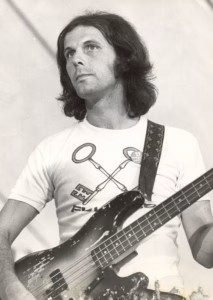 Do you have any memories from the Knebworth Festival in 1979 where Fairport Convention were the opening act for Led Zeppelin?
Do you have any memories from the Knebworth Festival in 1979 where Fairport Convention were the opening act for Led Zeppelin?
(Laughs) Oh, I have many memories of it. It was quite scary because we were the first act on. We were literally on the midday or something, in front of 100.000 Led Zeppelin fans. We thought that they wouldn’t like us, so we put a setlist together, a setlist of songs and tunes which were all up-tempo, without any long ballads or any kind of too folky in, because we thought they wouldn’t like us, but in fact they really enjoyed it. They thought we were ok. But because we played everything so fast, because we were scared that slow-tempos might not be enjoyed by the audience, we were supposed to play for an hour and we finished our set in 40 minutes and the compere came back on and said: “You have to play for another 20 minutes”. So, we just played a lot of jigs and reels and people were happy and then after our performance with Led Zeppelin, we had to go up to Cropredy because it was August 4 1979 and it was the day that we had our farewell festival at Cropredy, our farewell performance. That was the day we officially split up. So, that’s what happened, but obviously we ‘ve been back together since then and it was the start probably of our Cropredy Festival because the year after that we said: “Well, we really miss playing with each other. Let’s get together and just go and do a one-off concert in Cropredy. Let’s do it every year and let’s remember Fairport Convention and get back together with our friends”. That’s how the festival started.
Why Fairport Convention for years didn’t get paid by Island Records for their recordings?
That’s something that I could never understand. It was something contractually that somebody had signed on our behalf. Island Records were really good to us, don’t get me wrong: Chris Blackwell (ed: the owner) did everything he could to make Fairport Convention happen and he really helped us a lot. He got us a deal with A&M Records in America and when we eventually did the album, it was called “Rising for the Moon” (1975), they really tried hard on. It was when Sandy Denny (vocals) came back into the band and it was a fabulous album and we toured in America and England, but the trouble with Fairport’s music was that it wasn’t commercial, it wasn’t radio-friendly. So, no matter what the record company did; I mean, we had billboards on Sunset Strip (ed: in Hollywood), we did all the radio station interviews in the States and we did a big tour in England including the Albert Hall, which we did have a full house at the Albert Hall whether that was -the expression we use in England is- “papered” when people give away tickets in order to get an audience, I don’t know. In those days, I was never into the music business, at all. I was just the bass player in the band and I didn’t really know what was going on. I ‘m a lot more familiar with the music business now and if fact that’s why in 1979 when Fairport split, we set up our own record company (ed: Woodworm Records) and we started doing our own festival. But it took a long time for Island to actually cough up money that we thought that we were owed and there are various reasons. I think some of the members of the band and some of the people involved in it, already had issues and maybe had advances from Island Records for things that were Fairport Convention-related and that was all taken back of that band itself. It’s something that we are over now and everything is good and their accounts is perfect now. In fact, in July they are re-releasing on vinyl the “Full House” (1970), “Angel Delight” (1971) and “‘Babbacombe’ Lee” (1971) albums. So, that it ‘ll be great to see.
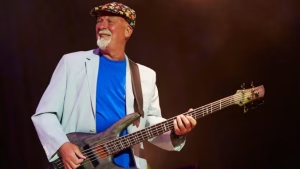 What was the greatest skill that Sandy Denny had?
What was the greatest skill that Sandy Denny had?
Well, you can’t say she had one greatest skill. Her greatest skills were songwriting, singing and performing, probably in that order. She was an incredible songwriter, an amazing singer and most of the time a fantastic performer. The only thing about Sandy, she was so insecure, she never thought she was good at anything. She always thought Joni Mitchell and Janis Joplin were better singers and Bob Dylan was a better songwriter. You know, she always underestimated her ability, but most musicians are like that; people don’t say how good they are. You have to be an outsider, really. I ‘m sure in those days Richard Thompson (vocals, guitar) didn’t realise how fantastically good he was on the guitar. When he was 18, he was up there with the Jeff Becks and Eric Claptons and Peter Greens. But Sandy’s greatest contributions were songwriting and singing, definitely.
How difficult was it for you to continue with the band after the “Rising for the Moon” tour when Sandy Denny, Trevor Lucas (vocals, rhythm guitar) and Jerry Donahue (lead guitar) left?
Dave Swarbrick and myself both lived in the village of Cropredy where we have our festival and Fairport Convention was something that Dave Swarbrick and myself really loved; it was what we wanted to do. So, it was really difficult after Sandy, Trevor and Jerry left and in fact, Dave Mattacks, he was gonna leave, as well and did. We had many years of getting our friends involved and trying to keep the band going. It was about three or four years of real hardship which is why in 1979 we split up. When we did that August 4th concert with Led Zeppelin and then our farewell appearance in Cropredy, we thought it was the end of the band and ostensibly was. Then, we became a reunion band and we just got together once a year to play a couple of nights at Cropredy, just for a bit of fun.
Led Zeppelin jammed with Fairport Convention at the Troubadour Club in LA on 4 September 1970. Do you remember that night?
(Laughs) I remember it vividly. Actually, I didn’t get up and play with Led Zeppelin because John Paul Jones had my bass and he is a much better bass player than me and he’s kept his hair on well. I wanted to be in Led Zeppelin. My friend, John Bonham, who was one of my best friends, obviously, became the drummer and Robert (ed: Plant), who is a mate of mine from Birmingham, who I knew as well, became the singer. I would love to be in Led Zeppelin, but in no way would I ‘ve ever been as good as John Paul Jones; he is such a monster musician. Before Led Zeppelin when he was a session man, he played and arranged so many hits in England and he was a beautiful bass player and a great musician. But that night, yeah, they got up and jammed and it was quite entertaining because sadly Jimmy Page had Simon’s (ed: Nicol -guitar, vocals) Gibson L7 guitar, which had a wire on 3rd string (ed: G), so it was very difficult for Jimmy to bend the strings and Richard (ed: Thompson) was up there with them. John Bonham dented Dave Mattacks’ snare drums so much, he had to replace the snare head the next day. Plant, he was fabulous. We all went to a club afterwards until 5 o’clock in the morning when the police raided it and luckily they didn’t find John Bonham and myself, who had passed out behind of a couple of amplifiers stacks from Savoy Brown. It was one of those nights (laughs).
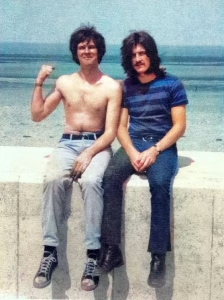
I ‘ve read that after the gig you and John Bonham partied so hard that Bonzo missed his flight to Hawaii. Is it true?
It’s very true, yes. Not only did he miss his flight to Hawaii, but he had all his clothes stolen from the swimming pool at the Tropicana motel. So, he had to borrow my clothes and the Fairport Convention’s credit cards to get a plane back to Honolulu the next day. We were not popular with Peter Grant and the other guys from Led Zeppelin, so apologies to Robert and John Paul Jones for that (laughs). I think they missed a rehearsal in Honolulu or wherever it was. But yes, John was ok and he got my clothes, which fitted in.
I’ve also read that that night Bonzo engaged in a drinking contest with Janis Joplin at Barney’s Beanery, an after-hours bar. Do you know anything about this?
Yes, I went to Barney’s Beanery after the night at the Troubadour. At 1 o’clock in the afternoon (ed: the next day) John phoned me and said: “Peggy, I ‘m going to Barney’s Beanery because I ‘ve got to catch a flight at 7 o’clock tonight to go to Hawaii for a rehearsal. Let’s have a quick drink” and we went to Barney’s Beanery and Janis arrived and the quick drink lasted until 19:00 or 20:00 when I was collected by Andy Joseph, who was the tour manager on that tour, because I had to play at the Troubadour that night. John passed out in my room at the Tropicana and he had all his clothes stolen, so he couldn’t go anywhere, anyway. I was on stage at the Troubadour club when I got the phone call from him saying: “Obviously, I missed my flight. Could you lend my some clothes?” It was a bad experience, but a great experience because we were young and wild (laughs).
So, you met Janis Joplin there, right?
I did, indeed. I met Janis and drank excessively with her and Janis was everybody’s hero as she was. She wanted a Mercedes Benz (ed: he refers to her song of the same title) and I’m sure she got it.
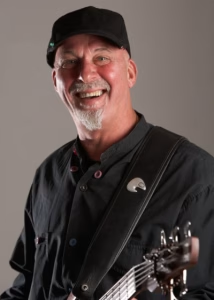 Was it an interesting experience to record “Bryter Layter” (1971) album with Nick Drake?
Was it an interesting experience to record “Bryter Layter” (1971) album with Nick Drake?
It was a fantastic experience. Well, not too much a fantastic experience, because you never knew whether Nick was happy with what you did, but as of all the recordings that I ‘ve ever made in my life, that album means so much to me. It’s an album that I can play all the time, it’s just a beautiful collection of songs, the arrangements by Robert Kirby, the production by Joe (ed: Boyd -Fairport Convention, The Incredible String Band, Pink Floyd), the engineering by John Wood, all the musicians who played on it, it was just incredibly special. It’s an album that I could play tonight and really enjoy. It’s my favourite album that I’ve ever played on, I must admit. But Nick was a strange guy, beautiful songwriter. Most of the album was done live with him playing the guitar at the same time as he did those amazing vocals. It’s down to the fact that John Wood was such a great engineer and the musicians were so sympathetic to the nature and the mood of the songs that it turned out that way. It’s a lovely album, I’m very proud of it.
What was Nick Drake like in the studio and out of the studio?
Out of the studio, I don’t know, because I didn’t socialize with Nick, he was a really introverted kind of man. In the studio we were too busy recording the songs. In the studio he did everything more or less live and very quickly, so probably I was only involved in that album for about three or four days’ work and when we were in a studio, we were working. But as I said, you never knew whether he was really happy with what you did or not. So, he was someone that I didn’t know. Everybody reads books about Nick Drake, everybody tells you the same answers at. That’s all I can tell you, he was a very introverted guy. You never really knew what he thought about stuff.
John Martyn’s “Solid Air” (1973) is one of my favourite albums. Is there any interesting story from its sessions?
Only the fact that John, again, was a fantastic person to work and so much off-the-cuff, there was never anything really planned. They were more or less jam sessions, if you like. He would get his Echoplex going, get everything going live in the studio and sometimes it worked, sometimes it didn’t. I mean, there is a single that he put out called “Dancing”, which is one of my favourite tracks. It’s on “One World” (1977) album. But the “Solid Air” album is great, again. It’s got my hero, Danny Thompson (ed: Pentangle) playing the double bass on it; Danny was incredible. If you saw John Martyn live with Danny that was something very special, because they just bounced off each other musically and the sound of the double bass and John’s acoustic guitar was amazing. John Martyn was way ahead of his time in terms of using echo effects and could still have an acoustic guitar sound going and then he had to pick up on it which went to his Echoplex and electric guitar amplifiers. So, it was almost like having two guitars doing different things at the same time. That’s what “Solid Air” came from. He just experimented in the studios so much. John was almost like a jazz performer. He was a very creative musician.
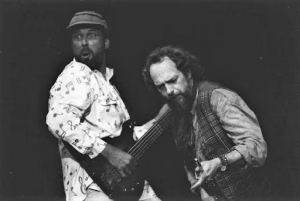
You played on Jethro Tull’s “Crest of a Knave” (1987). Were you surprised when Jethro Tull won the Grammy Award for Best Hard Rock/Metal Performance in 1989 over Metallica?
(Laughs) I was very surprised, as were Jethro Tull, because when Jethro Tull were nominated we all thought: “That’s ridiculous. We are not like a hard rock band, really” and the record company wouldn’t even pay for any member of the Jethro Tull to go to the presentation in Los Angeles. It’s a very expensive thing to go to the Grammy Awards. I forget how much it cost, it was something like $250 per person to go to the presentation ceremony, let alone the airfares to get there. So, none of the Jethro Tull went, despite the fact that Doane Perry, the drummer, who was on that album, lived in Los Angeles and he wasn’t invited to go to the Grammy Awards. Also, when Jethro Tull won the Grammy Award there was no one there to collect the Award on our behalf, so Alice Cooper bravely went up and collected the Award on our behalf, which I talked to him about when he played at Cropredy Festival a few years ago, because we were lucky enough to have Alice Cooper play at our festival. But “Crest of a Knave” is a great album, it’s a nice album, it’s not my favourite album from Jethro Tull that I played on. My favourite one is “Broadsword”, I really love the “Broadsword” album.
How much has your approach to bass changed over the years?
Sadly, it hasn’t changed at all. I do believe I still play exactly the same as when I took up the bass. I used to play the guitar at first, I was a lead guitarist in blues bands around Birmingham, in the Midlands of England, and I changed to bass when I was about 19 years. The style that I had when I changed to bass, I still have, I never learned any of the fundamentals about playing the bass guitar, it‘s just something that just developed and I never had any great technique. I ‘m a terrible bass player with my fingers unlike most bass players, I use a pick most of the time, like a plectrum, which is not fashionable, but that is the way I started to play the bass. What I do is: I use the bass as a supportive instrument and my favourite thing is to back singers/songwriters, people like Nick Drake, friends of mine who write songs like Anthony John Clarke or people in the Fairport like Chris Leslie or Ralph McTell. You know, I love great songs and I love to just play the bass behind them, that what I really get off: Following musically.
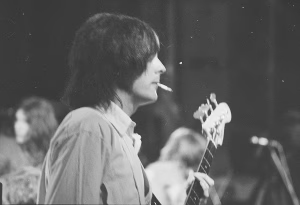 How important was the influence of Rick Danko (The Band) on you?
How important was the influence of Rick Danko (The Band) on you?
Very important, because when I joined Fairport we all moved into a house together, it was an old pub called “The Angel” in Little Hadham and everyone had their own hi-fi system and everyone had “Music from Big Pink” (1968) and “The Band” (1969), their first two albums. We were just huge Band fans and loved Rick Danko’s playing. I mean, at that time, my favourite bass players were Rick Danko, McCartney and Jack Bruce. They were the people that I really admired. Danko, I knew every bassline that he did on The Band records and sometimes when I do sessions, I just pretend I’m Rick Danko (laughs) and I try and play the bass in what I imagine he would have done and he was also an incredible singer and a great songwriter, as well. I had the honour of meeting him, I met him in Denmark. In fact, I got very over-refreshed drinking whiskey with him and had to go to hospital and have a stomach pump. This is nothing to do with music, it’s what just happens when you meet your heroes (laughs).
There is a great story about Dave Swarbrick (violin, mandolin -died in 2016) who had some trouble in San Francisco because of his guitar case. Would you like to share it with us?
(Laughs) It was in a hotel called “The New Yorker” in San Francisco and Swarbrick and his then wife -he just got married a few weeks before to a lady from New York-, they had a bit of an argument. The balcony window to their room which was about the 20th floor was open and she threw the guitar case from a new guitar that he got, luckily the guitar was not in the case, but she probably thought it was. She threw it at him and he ducked and it went out of the window and landed on someone’s car in the car park downstairs. So, Swarb had to evacuate the hotel the next morning. Everybody was looking out for somebody who had a guitar without a case. I think he wrapped it in his overcoat or something and managed to escape that way. It was a typical incident of being on the road in America which it can sometimes send you into some kind of craze (laughs). People do often crack up under the pressure.
You played with Cozy Powell (Rainbow, Black Sabbath -drums) in The Beast. Did your styles fit on stage?
The Beast was an incredible trio. I mentioned Jack Bruce from the Cream; the Cream was such an influence on us and the Beast was Cozy Powell playing the drums, Clem Clempson (Colosseum, Humble Pie) playing great lead guitar and myself playing bass. We based ourselves on Cream. We only did, I think, one gig; we just rehearsed for a week. We all fitted wonderfully together musically and we all had the same taste, but in those days, because we all lived in Birmingham or in the Midlands in order to succeed you had to leave and I had to join a London band, if your band couldn’t make it in Birmingham. So, that’s what happened. The Beast never really got to play together much because Cozy went off and joined Jeff Beck and Clem went off and joined Colosseum with Jon Hiseman (drums) and I went off and joined the Fairport, so that was it. I still see Clem Clempson from time to time and he became very successful with Colosseum and Humble Pie.
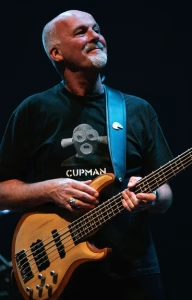 What is like to get people dancing with your music in 2024?
What is like to get people dancing with your music in 2024?
(Laughs) Oh, that’s a great question! Well, it’s fantastic when people do get up and dance. The Fairport’s music has changed a lot since those early days in the early ‘70s when we played a lot of instrumental music and our audience were the same age as us. They were young people that enjoyed getting up and dancing, but now our audience, a lot of them are the same age as us and the last thing they wanna do is get up and dance (laughs), because they ‘ll have their knees operated or they ‘ll have to do hips, so they don’t have the motivation to get up and dance. However, when we have our festival at Cropredy we have lots of young people to do get up and do stuff when you play dance tunes, so that’s always fantastic to see and it comes as a surprise because we are not used to it (laughs).
Are you optimistic about the future of folk rock?
Oh, I don’t know, Thodoris, because folk rock is something that I’m proud of being involved in, but there aren’t many new bands that come up and call themselves “folk rock”. It’s not with the media; the media tend to think this thing has been incredibly old-fashioned and stuff like that. But the music, there are elements of it still evident in some bands that go out and tour and do really well. But the future of it? I don’t know. I don’t know any new bands that call themselves “folk rock bands”.
Why don’t you consider yourself a musician saying: “I ‘m a bass player, it is only one above being a drummer”?
(Laughs) This is a joke. It’s a joke with musicians: The rhythm section is always the last one to be credited. It’s always the singer on the frontline or the lead guitarist or the saxophonist or whatever. When it comes to the rest of the band, the drummer is the last one usually to be mentioned. It’s a joke, it’s just a jape that we say: “Oh, you are a drummer, you are not a musician”. The bass player is only one above him. But what I do when people talk about that I say: “To be honest, if you want to play music, take up the bass because it’s very easy”. It’s much easier than the drums or the violin or the piano or the guitar. It’s much-much easier to play and you get to play with more people because not everybody wants to be a bass player. Everybody wants to be a lead guitar player but as a bass player you get to play with a lot of people. And you get the same money (laughs) !
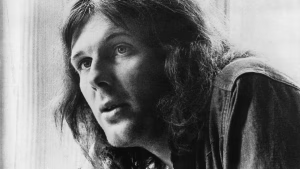 You also run Matty Grooves Records and Woodworm Studios. Does the business aspect distract you for creating more music?
You also run Matty Grooves Records and Woodworm Studios. Does the business aspect distract you for creating more music?
Well, Woodworm Studios I used to run. I set that up when I was with Jethro Tull because in those days Jethro Tull were very successful and Ian Anderson and Martin Barre (guitar) were really good to me and they gave me the funds and the money to be able to set up the studio which was really great and that was fantastic fun. I don’t own the studio anymore, but having the ability to use funds that Jethro Tull were paying me because they were so successful and they were very generous, Ian and Martin, to me. It was great having a studio because it meant that I could record Fairport Convention and some other friends, people like Dave Swarbrick did albums there, Dan Ar Braz did some albums there, Ralph McTell, Anna Ryder, lots and lots of people. It was great, but when I split up with my wife, the studio was sold and the record label, Woodworm Records finished as well. So, we set up Matty Grooves Records for the Fairport and we still have that label now. It’s a very convenient way of making your own music. We did all this because way back in the ‘70s when Fairport was splitting up, on August 4 1979, there wasn’t a major label that wanted to have us on their label because we weren’t commercial and we didn’t sell, so the only way we could carry on was to become independent and set up our own method of survival, in terms of a label and in fact a festival and that’s why we did it.
Is it flattering that Fairport Convention influenced musicians such as Nile Rodgers?
(Laughs) I was very surprised and indeed flattered when I ‘ve heard on a couple of occasions Nile Rodgers on interviews saying that Fairport Convention were an influence to him because our music has nothing really in common with the way Nile plays music. We are big Nile Rodgers fans and it was fantastic and it was good enough to come and play at our festival last year. Yes, it’s very flattering and we do get people saying that Fairport were influential, but I think Fairport have to be considered to be influential because what they did in the ‘70s with “Liege & Lief” album and some subsequent albums was totally different to what anybody else was doing in the world, musically. Even in America, “folk rock”, that expression, definitely has its roots and its origin in the album “Liege & Lief”. It’s the kind of album that defined a collaboration between traditional music and electric rock ‘n’ roll.
Did you feel comfortable when you backed Jimmy Cliff (Jamaican ska, rocksteady, reggae and soul musician)?
Oh, yes (laughs). Jimmy Cliff, yeah, because he came to England, it was when I played guitar; I played lead guitar on a group called Roy Everett’s Blueshounds and we had to audition. The Spencer Davis Group which had Steve Winwood (Traffic, Blind Faith) as its vocalist, recommended us to Jimmy Cliff’s agents and to Chris Blackwell, who was the guy that ran Island Records and brought Jimmy Cliff over from Jamaica. So, we had to audition and we passed the audition, so we became Jimmy Cliff’s first backing band and he stayed at my parents’ council house in Birmingham for a week and it was fantastic. He is an amazing person and he is so fit, he used to come down from my stair bedroom every day down the stairs walking on his hands (laughs). Really, it’s true and he was an incredible performer. It was before he started doing a lot of reggae music, he was very much a soul singer then.
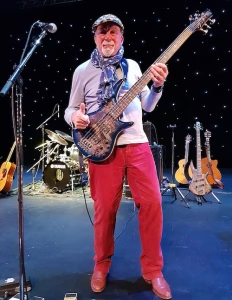 Did you enjoy the interview you did with Steve Di Giorgio (Testament, Sadus, Death -bass) in Guitar World in 2021?
Did you enjoy the interview you did with Steve Di Giorgio (Testament, Sadus, Death -bass) in Guitar World in 2021?
He is a fabulous bass player and it was an honour to do that, yeah, because he certainly knew a lot about the stuff that I ‘ve done with Jethro Tull. As I was saying, you don’t appreciate what you ‘ve done yourself personally. I think nobody knows about what I ‘ve done, really, especially bass players. I ‘m not a great technician, it’s not like our hero, Jaco Pastorius, when you listen to Jaco. I try to avoid listening to all these great bass players because it makes you feel so inadequate. You think: “Why should I be playing the bass? I ‘ve done nothing for this instrument”. But what happens is: You are not doing it to further the instrument, you are doing it for your own heartfelt feelings about music and it’s the joy that you get playing music, just accompanying somebody else when they pick up a guitar and play a song. If I can play bass along with them, I ‘m really happy and that’s what gives me the pleasure playing music. I ‘m not being able to do incredibly technical things on the bass, it’s always been the other way for me. It’s the joy that you get from making people happy, either if it’s them performing the song or if it’s the audience listening to it.
How much different is the dynamics of the rhythm section between playing with Gerry Conway and Dave Mattacks?
That’s an interesting question. It’s totally different. Gerry was very much a laid back drummer. But Gerry technically had lots of what we call “chops”, but his approach was a lot more laid back than Dave Mattacks’ approach. Dave Mattacks technically has incredible ability and dynamically has a bigger dynamic range than Gerry did, because Gerry hadn’t so much, because he was kind of a soft, laid back drummer that grooved away in the background. Not that Dave Mattacks plays out front a lot, but if it is needed Dave Mattacks can be really dynamic. So, the dynamics in terms of volume and texture are far greater with Dave than they were with Gerry, especially Gerry in his later years when he would play less and less because he felt it wasn’t needed with Fairport. Because he was creating the music with Fairport, his input was all there on recorded stuff. If we played stuff that Dave Mattacks had played on, it wasn’t what he really wanted to do, although he was the biggest Dave Mattacks fan and vice versa. All drummers are amazing because they really love and respect each other’s playing. John Bonham was a huge Dave Mattacks fan and a huge Gerry Conway fan, in fact.
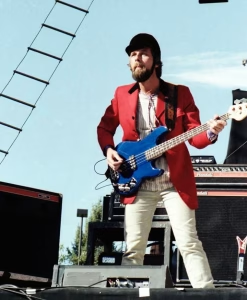 Is it a bit weird that you son, Matt (bass), plays in Procol Harum?
Is it a bit weird that you son, Matt (bass), plays in Procol Harum?
No, because my son sadly can’t play with Procol Harum anymore because Gary Brooker (vocals, keyboards) passed away. My son, Matthew is a fantastic bass player. He started playing the bass when he was about 11 or 12 and his biggest influence was Mark King of Level 42 and he did all the slap bass stuff. He was really brilliant at that. That’s all we heard in our house: Matt slapping the bass; he ‘s got a great technique at doing that. But as he grew older he grew out of that. He started to appreciate music probably more of my generation or stuff that came out in the late ‘60s and ‘70s. He loved Procol Harum, so when he got the chance to play with Procol Harum, he did and he was with them for over 20 years. It’s just a sad loss that he can’t be with them now. He plays with the City Funk Orchestra now, which is fabulous but it’s not the same as being in a band that they are touring all the time. Matt is playing at Cropredy Festival this year with Rick Wakeman (Yes, Strawbs, David Bowie -keyboards) on Thursday 8 August and that’s gonna be great. I start this year at 4:00 in the afternoon with our Fairport’s acoustic show and then Matt is on at the end of the night for 1 ½ hour with Rick doing the “Journey to the Centre of the Earth” (1974).
Do you like Irish folk bands like The Dubliners, The Chieftains and Clannad?
I love them! I love all of them! I knew the Chieftains very well and I knew The Dubliners very well. Clannad, we had at Cropredy a couple of times. Sadly, they split up. I love Irish music, Paul Brady, I love Irish tunes and living in Brittany most of the musicians here, the traditional musicians, play all the Irish tunes. I have friends in America, my friend, Brian O’Malley sends me a lot of tips on current Irish music. Irish traditional music is out of this world. You know, it will be there forever, that’s why I want to be a Celt.
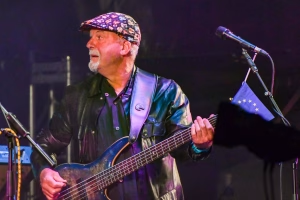 It seems that humour has been an important part of your life. Does today’s music need more of it?
It seems that humour has been an important part of your life. Does today’s music need more of it?
That’s a great question. There have been so many great humourists musically, people like Jake Thackray, I don’t know if you are aware of him; people that write very-very funny songs but very musical songs. I think the Fairport when we do shows, we are very serious about our music -don’t get me wrong- but we try and do it in a very unserious manner; we take the mickey out of ourselves, we don’t take ourselves too seriously. We try and entertain people as much as we can, because the music is serious, the songs are all very important to us. Fairport has been always been a band that had proper songs, songs that tell a story. For us, the very nature of our music is: You ‘ve got to be able to understand what the song is about and it’s got to say something meaningful, it’s got to have a meaningful message and be put across in a meaningful manner. But we hope that it will make you laugh, if it’s appropriate.
By the way, had you ever met Jack Bruce or John Entwistle (The Who -bass) ?
I met John Entwistle, yes, and I met Jack Bruce a couple of times, yeah, and they were both wonderful players and wonderful people. The great thing about doing music, when you are as old as I am, I mean, I’m 76 now, and I ‘ve met most of my heroes. My biggest hero ever that I ‘ve met is Paul McCartney. He was absolutely charming, a wonderful man and totally just wonderful; he made everybody feel really relaxed, which is difficult when you are meeting Paul McCartney, because it’s like meeting God (laughs).
A huge “THANK YOU” to Mr. Dave Pegg for his time. I should also thank Stevie Horton for his valuable help.
Official Dave Pegg website: https://www.davepegg.co.uk/
Buy “Off the Pegg” autobiography from here
Fairport Convention Official Website: https://fairportconvention.com/
Fairport Convention Official Facebook page: https://www.facebook.com/Fairportofficial/

